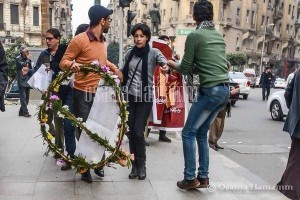Violence Continues in Egypt
At least 20 people were killed and 80 injured in violent clashes between protestors and Egyptian security forces this weekend that resulted in more than 400 arrests. Anger was palpable on Sunday at the funeral of demonstrator Shaimaa al-Sabbagh, who had succumbed to gunshot wounds sustained at a march in central Cairo on the eve of the anniversary of Egypt’s 2011 revolution. Sabbagh, a leader in the Socialist Popular Alliance Party and a mother of one, was reportedly struck by birdshot when police tried to disperse the crowds in Tahrir square and died soon thereafter. Graphic footage shows the extent of her injuries and scenes from the march and the moments after the fatal shots.
Egyptian officials and pro-government media have disputed claims that police used live fire to disperse the demonstrators and are responsible for Sabbagh’s death.
In Alexandria on Friday, 17-year old high school student Sondos Reda Abu Bakr was killed when police opened fire at demonstrators rallying in support of ousted and currently incarcerated Muslim Brotherhood president Mohammed Morsi. Morsi’s successor, current president Abdel Fattah el-Sisi, was elected in June 2014 after massive protests and a subsequent coup against Morsi, the country’s first democratically elected civilian president.
“Mubarakism on Steroids”
As Egyptians pass through the fourth anniversary of their revolution, the euphoria and jubilation that teemed throughout the nation seems to have been largely replaced with despondency and cynicism. This year’s anniversary comes on the heels of multiple developments that have fueled profound disenchantment and disillusionment with the events that followed the start of Egypt’s revolution.
In November, the Cairo Criminal Court dismissed charges against Mubarak regarding the deaths of hundreds of protestors calling for his ouster in 2011. Mubarak’s two sons, Ala’a and Gamal, were also recently acquitted of corruption charges.
Meanwhile, thousands, including political activists and journalists, remain jailed, among them an Ohio State University graduate shot and detained in the aftermath of a violent dispersal of sit-in protesters in August of 2013 that claimed thousands of lives. January 26 marks the anniversary of a now year-long hunger strike by dual American-Egyptian citizen Mohamed Soltan, who appeared in recent photographs to be in critical condition.
The government’s frequent crackdowns on dissent have led some to liken the current situation to an even worse throwback to the era of Mubarak—a phenomenon termed “Mubarakism on steroids.” Recent clashes have coincided with the shooting of a security checkpoint in Giza and a bombing in Cairo that left five wounded.

